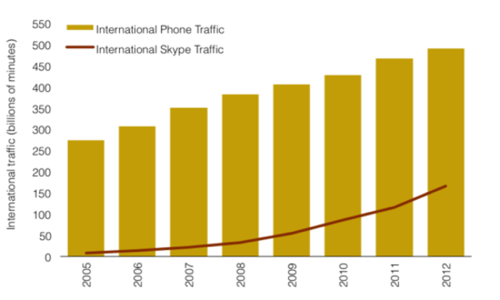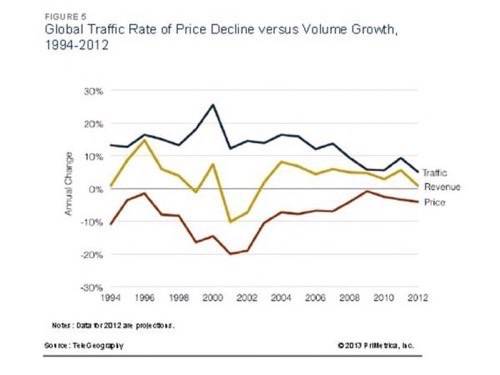
At CeBIT this week, Microsoft COO Kevin Turner revealed that 33% of the world’s voice calls happen on Skype now, as Stephen Shankland reports. That’s a tremendous number. But it just might represent a hollow victory for Microsoft, which owns Skype.
Microsoft acquired Skype to “increase the accessibility of real-time video and voice communications, bringing benefits to both consumers and enterprise users and generating significant new business and revenue opportunities.” The video aspect of the deal may well bear fruit, but voice? Voice communication is now a commodity, one that telcos – mobile and fixed line alike – are finding it increasingly hard to monetize.
This Is The United States Calling, Are We Reaching…?
Ironically, Skype can shoulder some of the blame, as an ARCchart study points out. And I might as well admit it: I’m part of the problem. I had to make a call from London to the US today, and didn’t want to impoverish my family by paying AT&T’s absurdly high roaming rates. So I sprinted to St. Pancras station, logged into the free wifi, and made my call using Skype. It wasn’t free, but at pennies per minute, it might as well have been.
I’m clearly not alone in using Skype to skirt telco’s last source of profitability for voice – international calling – which has continued to grow:

That’s the upside: Skype is cannibalizing international voice traffic. The downside is that overall traffic has fallen, as TeleGeography, Analysys Mason and others have shown, and voice’s profitability keeps falling:

So Skype is now the Robin Hood of voice traffic, taking from rich telcos and giving to… itself. And its customers. Fair enough. That’s the free market.
Still, I wonder if Microsoft benefits much from owning a big stake in a depreciating asset (voice), one that brings with it a host of data privacy issues. Again, video may well prove to be the winning bet, with instant video communications popping up around Word documents and PowerPoint files.
But come on: do you really want that?
The Viability Of Skype
This seems somewhat similar to eBay’s acquisition of Skype. Remember how then-eBay CEO Meg Whitman pitched the deal? That sellers and buyers could commune over Skype to haggle over a sale? It never happened. And frankly, who besides the most deluded within eBay ever thought it would? We type and text because we don’t want to talk. And while I occasionally find video conferencing useful within my workplace, I mostly avoid it.
In the US, mobile carriers now concede that voice is a commodity, changing their pricing strategies to give away voice at flat rates and actively seeking new revenue opportunities through data, among other things. Microsoft now owns one-third of that commodity, grossing (and netting?) far less per minute than the carriers ever did. Presumably this will shore up Microsoft’s already impressive collaboration tools, even if Skype’s revenue contribution – estimated at $792 million in FY 2012 – doesn’t move the Microsoft needle.
But given our decreasing willingness to pick up the phone and call people, did Microsoft essentially pay $8.5 billion for a nice upgrade on its Windows Live Messenger service, which actually had three times as many users as Skype at the time of acquisition? It’s possible. It’s also possible that Microsoft will turn Skype into gold, perhaps by integrating it seamlessly into Windows Phone 8. Or maybe it simply gives Microsoft access to an instant messaging platform that I and others routinely do use in a business context, unlike Windows Live Messenger, which is almost wholly a consumer tool.
But right now, there’s a valid question as to whether Microsoft owns one-third of an asset that its telco competition expects to replace, and which its business customers may actually not want to use.
Disagree? I’d love to hear your thoughts.
Image courtesy of Shutterstock.

















